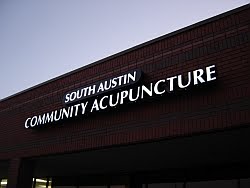A couple of issues or so back, the New England Journal of Medicine published a clinical vignette on acupuncture and the treatment of chronic back pain. They also reviewed the literature and mentioned the German studies where so called "sham" acupuncture worked nearly as well as so called "real" acupuncture. Both the real and the sham involved the insertion of needles into the body.
The conclusion: real acupuncture has not been demonstrated to be more effective than sham acupuncture, and so might just be placebo.
This blows my mind just a little bit. I propose that the question raised by such a study is not whether or not acupuncture is placebo, but what is "real" acupuncture? To my mind they are drawing a conclusion before even beginning to study the problem. There is a bias towards assuming what you do not understand must be placebo. I find that to be just a little bit ridiculous. It seems to me before you can study real acupuncture vs. sham acupuncture, you might first need to understand what real acupuncture is....
Almost as striking were the comments sent in by readers. One was from several Chinese doctors saying basically if you're going to study this stuff, you have to put it in the context of Traditional Chinese Medicine. Another was from a reader who questioned the ethics of recommending a course of treatment that could well be placebo. He makes the point that a course of 10-12 treatments as proposed in the vignette could cost $1000-$1500.
I think these two comments frame nicely the problems this medicine faces in our country, and how community acupuncture potentially offers sensible solutions.
First of all, I don't buy the notion that acupuncture must be performed strictly adhering to the principles of Traditional Chinese Medicine to work, or to be studied effectively. There are too many ways of doing acupuncture that are all effective to some degree or another, and they are not all TCM. In fact, too much of what is taught in acupuncture schools is taught without question, and much of what is taught probably should probably be framed in more of an anthropological perspective. I'm not dismissing TCM, it's just it's hard to see how we will ever arrive at clear inquiry if it is ever necessary to be self referential in order to be valid. To attempt to scientifically study acupuncture through the lens of TCM is to distort the picture from the beginning. There are too many cultural assumptions of validity. Just because it's agreed upon doesn't make it science.
Now to be fair, there is more to Chinese medicine than acupuncture. If I were treating someone's low back pain, chances are I would use cupping, and chances are I'd use herbs. Chances are too, I wouldn't even put a needle in their back! None the less, we've got to start cutting through the exoticism that surrounds this medicine if we truly want it to be widely used. As it stands, most recent surveys indicate about 1% of the population using acupuncture in a given year.
Essentially you've got the white folk saying we don't understand it so it must be placebo, and the Chinese saying you don't understand it because you're doing it wrong and so you'll never understand it.
I think everyone is demonstrating a lack of perspective, but I am none the less hopeful that over time meaningful inquiry will emerge.
Theory and philosophy are one thing, clinical practice another, and scientific inquiry another thing still.
The second comment, about sending someone off for $1000-$1500 worth of treatment indeed raises some questions, and they are obvious ones: At that rate, these would be $100 to $150 per session treatments. Seriously, who can afford to do that? This is precisely where acupuncturists so often get in a bind. Unless the patient is wealthy, what likely will happen is the patient will likely have expectations around treatment that probably aren't realistic - in part because they can't afford a course of treatment, and in part because they are going to assume you have some special powers if you're charging those rates. The whole thing fosters unrealistic perceptions and expectations about what acupuncture is, and how it works both on the part of the patient and the practitioner.
Acupuncture is either going to help, or it's not. And if it doesn't, it's not because the patient was a non-believer, and it's probably not because the practitioner failed to make the correct TCM zang fu diagnosis either...zang who?
Onward




